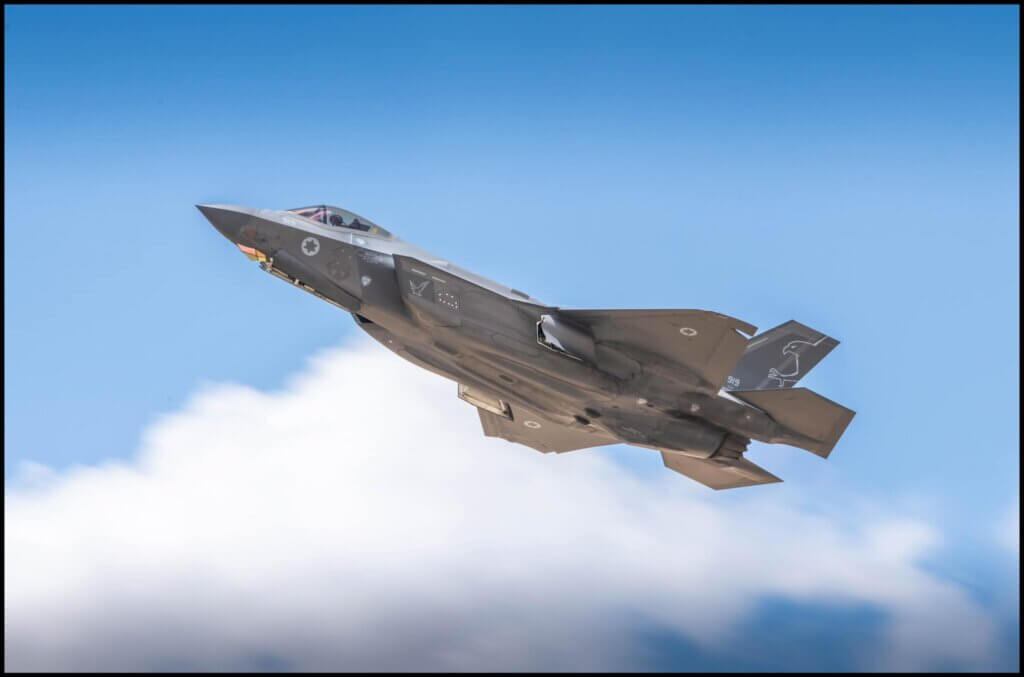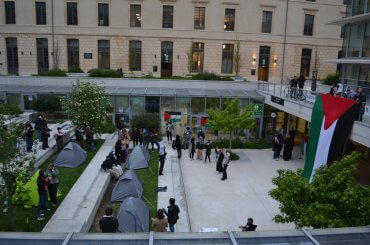Yesterday, an appeals court ruling in The Hague ordered the Dutch government to cease exports of F-35 fighter bomber components to Israel.
The ruling overturned a December 15 decision by the District Court of The Hague, dismissing a suit by three Dutch human rights groups seeking a halt in the provision of F-35 spare parts to Israel.
Those spare parts are stored at Woensdrecht Air Base, at the top of the Scheldt estuary, one of three European ‘logistics hubs’ for Lockheed Martin’s “lethal” F-35 Lightning II stealth bomber. F-35 users from across Europe (and Israel) go there to pick up spare parts under a general license applying to all members of the “international F-35 program.”
For the Dutch rights groups who launched the F-35 parts case, yesterday’s Appeals Court ruling reaffirms the primacy of international law in their country’s international dealings and the role of citizens’ groups in furthering the law’s enforcement.
“[For] this government, at this moment, trade and international relations with the United States and Israel are more important than international law,” Rights Forum Director Gerard Jonkman told Mondoweiss. “And if this country, with this attitude, has to stop now supplying Israel with these spare parts, I think this is really significant, and this is a big blow for the Dutch government, definitely.”
The Court ruling
On close reading, Monday’s 18-page Appeals Court ruling was much more than about the provisioning of spare parts for high-performance fighter bombers in an increasingly bloody war.
Its most significant arguments enunciated the primacy of international law over shortsighted and arguably illegal trade and foreign policy and the critical role of citizens in upholding the rule of law.
“The court recognizes the interest that the State has in ensuring that the Netherlands fulfills its international obligations towards the US, an important ally,” the three-judge Appeals Court panel ruled. But, “compliance with [its] international obligations … carries more weight.”
With equal vigor, yesterday’s ruling dismissed government arguments that Dutch citizens and civil society groups have no “interests” to defend on behalf of the civilian population of Gaza, nor the right to challenge government compliance with its commitments under EU and wider international law.
The three Dutch groups that brought the F-35 case — Oxfam Novib, PAX Netherlands Peace Movement Foundation, and the Rights Forum – “are public interest organizations that pursue, among other things, the aim that no serious violations of international humanitarian law are committed with weapon parts supplied by the Netherlands,” the ruling stated. Furthermore, it declared the standards of the Netherlands Customs Act and EU Common Agreement “indeed serve to protect the interests” of Dutch civil society groups.
It’s an argument that stands to be cited in proceedings elsewhere around the world, where the right of citizens to challenge arms exports or sue foreign officials under their own domestic laws have been summarily dismissed — in the Netherlands, U.S., and Canada, for example.
F-35 sales to Israel violate Dutch obligations under Article 1 of the four Geneva Conventions, requiring state parties to “respect and to ensure respect” for the conventions in “all circumstances,” attorney Liesbeth Zegveld argued before the lower court on December 4.
Zegveld also argued that the Dutch export of F-35 parts to Israel violates the 2014 Arms Trade Treaty and the 2008 Common Position of the Council of the European Union.
The Common Position states that export licenses “shall be denied if approval would be inconsistent with … the international obligations of Member States,” or if “there is a clear risk that the military technology or equipment to be exported might be used for internal repression,” or to commit “serious violations of international humanitarian law,” or that “the intended recipient would use the military technology or equipment … aggressively against another country or to assert by force a territorial claim,” or for purposes “other than for the legitimate national security interests and defence of the recipient.”
Blocking F-35 parts exports would be nothing new. According to the NL Times, between 2004 and 2020, the Netherlands government refused to issue permits for the export of military equipment to Israel on 29 occasions.
Still, on December 4, government lawyers told the District Court that F-35 parts exports to Israel should continue. Israel’s fleet of F-35I Adirs was central to its “regional security strategy,” they claimed.
Government lawyers also argued that, by halting F-35 parts exports, the Netherlands would be reneging on agreements to reliably supply these from its Woensdrecht hub, undermining the “expectations of all F-35 partners” and imposing administrative costs on all members of the international F-35 program.
Even if it did cut off parts exports, Israel would turn to other sources, government lawyers told the court. “The Netherlands has no say in this.”
Dismissing these bureaucratic arguments, a three-judge panel of the Netherlands Appeals Court ordered the Netherlands government to cease all export and transit of F-35 parts to Israel within seven days of yesterday’s ruling and to pay Oxfam Novib’s costs of $7800.
Citing provisions of the EU Common Position and the Arms Trade Treaty, the Appeals Court ruling states that “there is a clear risk that the F-35 parts to be exported will be used in committing serious violations of international humanitarian law,” or to “facilitate” such violations.
Serious violations have already been committed, an unofficial translation of the February 12 ruling states:
“The facts show that large numbers of civilian casualties have been caused, including thousands of children, that thousands of homes have been destroyed, that ‘dumb bombs’ are used, that every residential area is attacked if there is even the slightest indication of terrorist activity taking place, that Previously [sic] applied limits regarding ‘collateral damage’ in the current conflict have been expanded, the policy of warning civilians before an attack has been abandoned, drinking water supplies, bakeries and a grain mill have been destroyed … and many of Gaza’s hospitals are no longer functioning. It is not plausible that this destruction was inflicted exclusively on military targets or constituted legitimate ‘collateral damage’, not only in view of its unprecedented scale, but also in view of the statements made by Israeli soldiers themselves. Based on the foregoing, the court also concludes that the violations of international humanitarian law for which there is a clear risk are ‘serious.'”
The court’s response to the government’s arguments that it isn’t obliged to reassess arms exports in response to overwhelming evidence of war crimes was withering.
Granting arms export permits that would never have to be reassessed, even if serious violations of international humanitarian law were committed by the country of destination (including the risk of genocide, Dutch rights groups argue), would undermine the EU Common Agreement, not to mention the Netherlands’ obligations under the Geneva Conventions and its Additional Protocols, which oblige states “to ensure ‘in all circumstances’ that another state acts in accordance with international humanitarian law,” the Appeals Court declared.
“[The Minister] has failed to appreciate … that if such a serious risk exists, she is already obliged under the [Common Agreement] to prevent the export of F-35 parts to Israel, regardless of any other foreign policy considerations such as good relations with Israel and The United States,” the court said.
In response to the government’s other arguments – that Israel will turn to the U.S. for its F-35 spare parts; that the survival of its arms depot at Woensdrecht Air Base is at stake; that granting Oxfam’s claim would have “immediate, irreversible and immense consequences” for the Netherlands’ “position in the world,” leading to “doubts” about its “reliability,” with corresponding impact on Dutch, European and global security, not to mention the well being of the Pentagon’s F-35 project – the court declared itself “not convinced.”
Dutch government reaction
The sale of F-35 spare parts to Israel “is not unlawful,” a Dutch government media release declared within hours of yesterday’s Appeals Court ruling. “The government believes it is up to the State to its determine foreign policy.” [sic] The Dutch government plans to appeal – a decision welcomed in Israel.
“I’m quite sure that even if they will appeal, we will win,” the Rights Forum’s Jonkman told Mondoweiss. “It will cost a lot of money. It will cost a lot of time. I think it’s useless for the government to appeal. It’s very clear that at this moment in this state you cannot send weapons or parts of planes or whatever to a country from which the International Court of Justice is telling that there’s plausible genocide taking place.”
“The government will consult with international partners within the F-35 programme very soon in order to secure the Netherlands role’ within the programme,” the government’s release continued, “The government will do everything it can to convince allies and partners that the Netherlands remains a reliable partner in the F-35 project and in European and international defence cooperation. That cooperation is important for the Netherlands’ own national security. But it’s also essential for Israel, because the F-35 aircraft is crucial for Israel’s security, in particular with regard to threats emanating from the region, for instance from Iran, Yemen, Syria and Lebanon.”
“The State’s decision to lodge an appeal … is separate from the situation in Gaza,” the release continues. “The Netherlands continues to call for an immediate temporary humanitarian ceasefire, and for as much humanitarian aid as possible to be allowed to reach the suffering people of Gaza. The situation is extremely serious. It is clear that international humanitarian law applies in full and Israel, too, must abide by it.”
John Dugard views the Netherlands’ position with jaundiced eyes. In response to a query from Mondoweiss, the South African jurist and former UN Special Rapporteur on the human rights situation in occupied Palestine writes:
“The Netherlands repeatedly and proudly claims to be the international law capital of the world. In these circumstances it is strange that it has failed to endorse the decision of the ICJ in South Africa v Israel. It is even more strange that it should so hastily decide to appeal the decision on F-35 parts which on the face of it puts The Netherlands in conflict with the decision of the ICJ. It is a sad day for international law in the Netherlands. Has it lost its way?”



At least the judiciary in NL is still functioning well, to some extent.